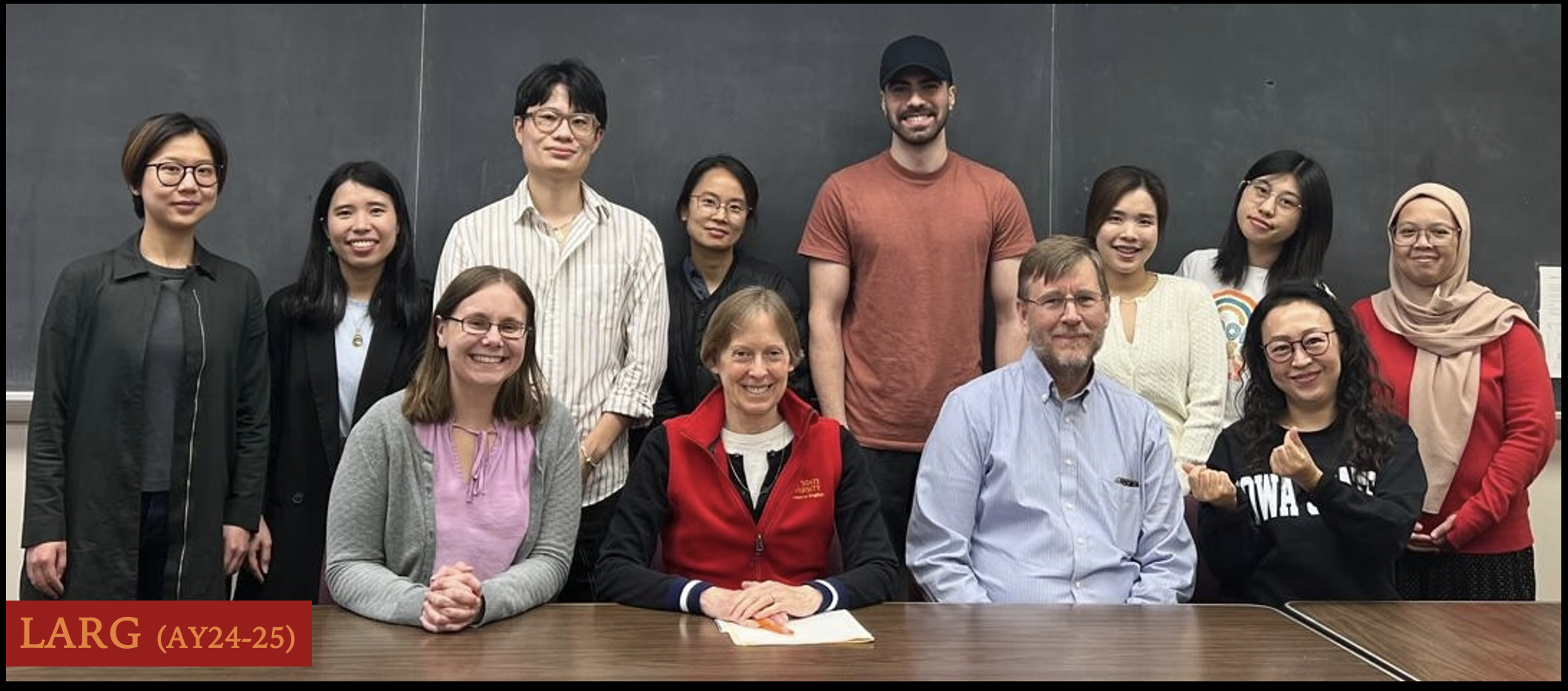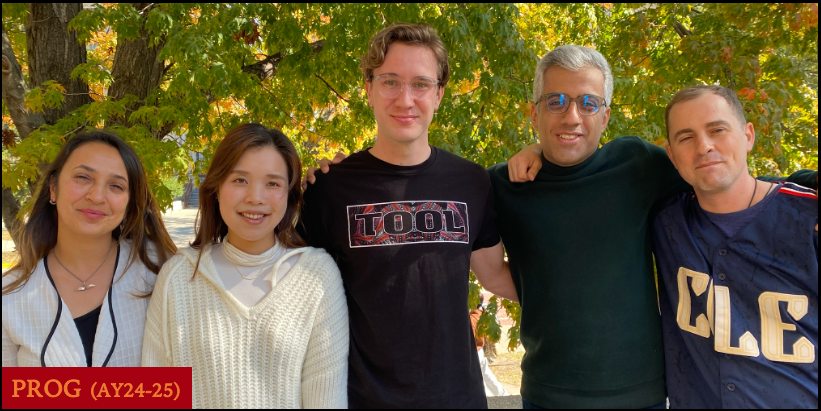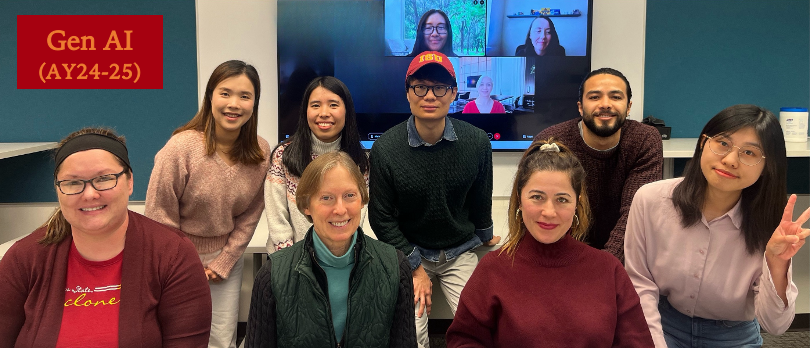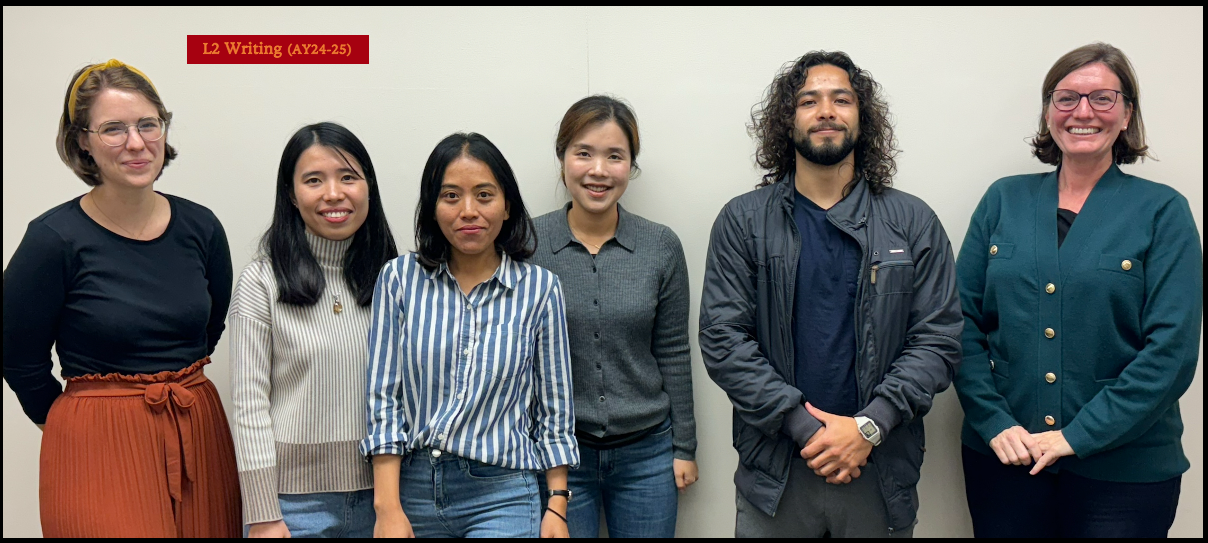Research Groups
The Applied Linguistics area will coordinate the following research groups in Spring 2026:
- Corpus Linguistics
- Language Assessment (LARG)
- Pronunciation (PROG)
- Generative AI in Applied Linguistics (GenAI)
The flyer below provides additional information as well as the schedule for each of the groups. These research groups are intended as collaborative spaces for discussions of issues related to these fields, skill development, and the collegial exchange of ideas.
All department members are invited to attend, and you can attend one or all, or any number in between. Contact information is provided on the flyer. Please contact the individual listed to learn more about each group’s plan for the semester, or to be added to the contact list for each group. More information about our research groups is also available below.

Corpus Linguistics Research Group
The Corpus Linguistics Research Group meets regularly to discuss foundational issues in corpus linguistics methodologies, explore current trends and research issues in corpus-based language studies, and pursue shared research goals and interests as determined by the group. The goal of this research group is to bring together members of the ISU community with a shared interest in corpus linguistics methods regardless of experience level, bringing together faculty and students to mutually benefit from scholarly exploration and skill development. The group considers (a) foundational issues such as corpus design and compilation along with implications for ISU corpus projects; (b) technological issues such as program/tool development and evaluation; and (c) corpus-based skill development through hands-on demonstrations and workshops. The group also provides workshopping opportunities for members to collaborate and provide feedback on projects, conference proposals, and presentations.
Language Assessment Research Group (LARG)
The Language Assessment Research Group was formed to help language assessment students find jobs and summer internships and obtain funding for their research. To achieve these aims, it provides students opportunities to present and receive feedback on potential publications and presentations and connects students to alumni and other influential individuals in the language assessment field. Since its inception, it has offered students workshops on how to write conference proposal abstracts, grant applications, internship applications, book reviews, commentaries, and test reviews. It works closely with its allied student group, the Language Assessment Student Organization, in each of these endeavors.
Pronunciation (PROG)
The current PROG members include three first-year PhD students, Mostafa Ranjbar, Chris Litten, and Max Prikazchikov and one senior PhD student, Inyoung Na. This semester, PROG meetings have prioritized getting the new PhD students acclimate to the program, learn some fundamental concepts in pronunciation research, go through CITI training required for IRB applications for research projects, and learn data collection platforms such as Gorilla and PsychoPy. Additionally, the group members started to work on a project focusing on L2 fluency and how it is impacted by factors such as task complexity, L2 proficiency, L1 background, and a speaker’s fluency in their L1. Looking ahead, the group plans to complete fluency-related readings in Spring 2025 and clarify the focus of their project and design their data collection materials and tasks.
Generative AI in Applied Linguistics (GenAI)
The GenAI Research Group is composed of graduate students and faculty who share a common interest in exploring the capabilities of generative AI (GenAI) and its use in language education. Our primary goal is to advance understanding of how GenAI impacts teaching, learning, and other educational practices. Our activities focus on current issues surrounding GenAI in language education in biweekly meetings featuring guest speakers, presentations from participants, discussions of ongoing research projects, and supporting the annual Technology for Second Language Learning Conference. Our key areas of focus include:
- Exploring the applications and implications of GenAI in language teaching and learning
- Investigating the role of GenAI in educational practices, including assessment
- Engaging with the latest developments and challenges in GenAI research
- Collaborating on research that contributes to the growing body of knowledge on GenAI in language education
The GenAI Research Group welcomes graduate students, faculty, and professionals with any level of knowledge wanting to explore the role of GenAI in language education. Participants can engage with the GenAI Research Interest Group in several ways by 1) attending biweekly meetings to join discussions of GenAI in language education 2) Participating in practice presentations and invited speaker sessions 3) joining collaborative projects that explore GenAI’s role in the educational context or 4) subscribing to our email list for updates on upcoming events, research opportunities, and discussions. The GenAI Research Interest Group meets biweekly with two options for participation either in-person at Ross 212 or online via Webex.
The members of the GenAI Research Interest Group share an interest in learning about all facets of GenAI as a linguistic, educational, and social phenomenon with an emphasis on language education. Interests in language education include language learning, teaching, and assessment, as well as teacher professional development. If you are interested in exploring the role of GenAI in education and would like to join our discussions and projects, we welcome you to become a part of the GenAI Research Interest Group. To get involved, please reach out to Dr. Carol Chapelle at carolc@iastate.edu for more information.




